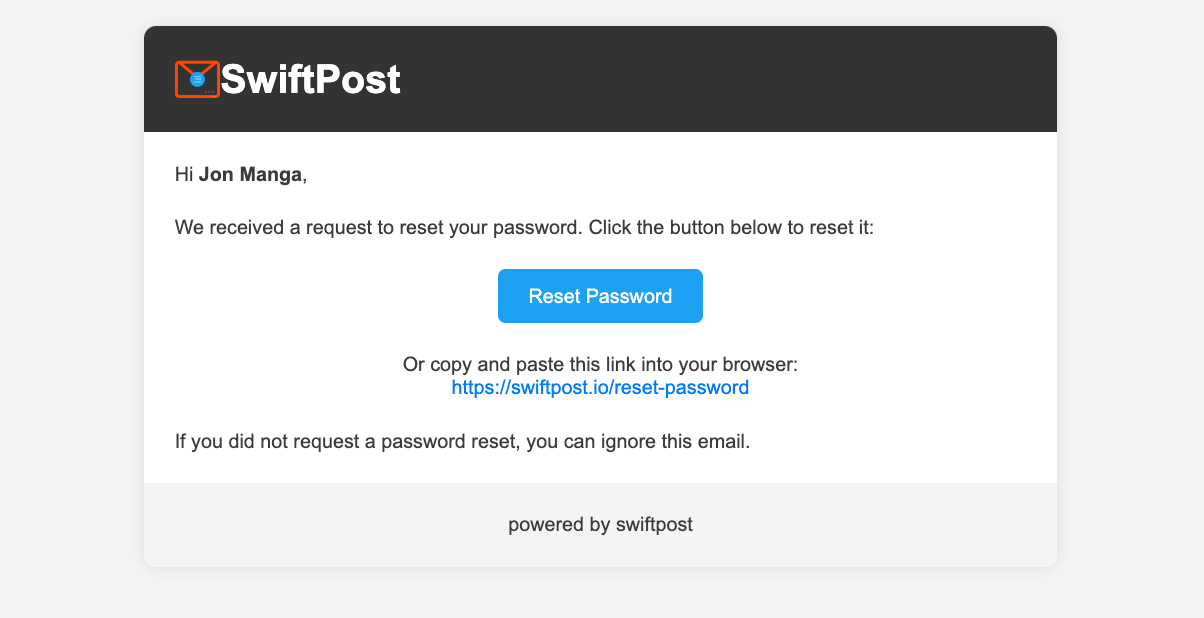Allows you to compose and send swift html emails, with a special focus on authentication emails. It provides a flexible template system and integrates with Nodemailer for email delivery.
npm install @swiftpost/mailConfigure SwiftPost with your SMTP settings.
By default, it will use the environment variables SMTP_HOST, SMTP_PORT, SMTP_SECURE, SMTP_USER, and SMTP_PASS to configure the SMTP connection. If SMTP_URL is set in the environment, it will be used instead. If SMTP_FROM is set, it will be used as the default sender email address.
import { SwiftPost } from "@swiftpost/mail";
const swiftPost = new SwiftPost({
host: "smtp.swiftpost.io",
port: 587,
secure: false,
auth: {
user: "[email protected]",
pass: "password",
},
from: "[email protected]",
});Use the provided methods to send different types of emails.
await swiftPost.sendWelcomeEmail(
{ to: "[email protected]" },
{
name: "Jon Manga",
companyName: "SwiftPost",
link: "https://swiftpost.io/welcome",
}
);| Method | Description |
|---|---|
sendWelcomeEmail |
Generates and sends a welcome email. |
getWelcomeEmailHtml |
Renders and returns the html for a welcome email. |
sendConfirmationEmail |
Generates and sends a confirmation email. |
getConfirmationEmailHtml |
Renders and returns the html for a confirmation email. |
sendPasswordResetEmail |
Generates and sends a password reset email. |
getPasswordResetEmailHtml |
Renders and returns the html for a password reset email. |
sendPasswordlessLoginEmail |
Generates and sends a passwordless login email. |
getPasswordlessLoginEmailHtml |
Renders and returns the html for a passwordless login email. |
sendAcceptInvitationEmail |
Generates and sends an accept invitation email. |
getAcceptInvitationEmailHtml |
Renders and returns the html for an accept invitation email. |
sendPasswordInvitationEmail |
Generates and sends a password invitation email. |
getPasswordInvitationEmailHtml |
Renders and returns the html for a password invitation email. |
sendWelcomeWithCredentialsEmail |
Generates and sends a welcome with credentials email. |
getWelcomeWithCredentialsEmailHtml |
Renders and returns the html for a welcome with credentials email. |
sendMail |
Sends an email using nodemailer's sendMail method. |
SwiftPost options extend the Nodemailer SMTP options.
| Option | Type | Description |
|---|---|---|
host |
string | The hostname or IP address to connect to (e.g., "smtp.swiftpost.io"). |
port |
number | The port to connect to (e.g., 587). |
secure |
boolean | If true, the connection will use TLS when connecting to the server. |
auth |
object | Authentication object containing user and pass properties. |
from |
string | The default email address to use as the sender. |
url |
string | SMTP URL to connect to. |
transport |
object | Custom transport object or string. |
templatesDir |
string | Directory path for email templates. You can specify your own path is you want to override the templates |
debug |
boolean | If true, enables debug mode for logging. |
You also have access to the @swiftpost/templ package to use and render your own templates.
Example of a custom template:
const templatePath = path.join(__dirname, "templates", "my-template.html");
const html = await swiftPost.templ.render(templatePath, {
name: "Jon Manga",
});const template = `<h1>Hello {{ name }}</h1>`;
const html = await swiftPost.templ.render(template, {
name: "Jon Manga",
});
await swiftPost.sendMail({
to: "[email protected]",
subject: "My Template",
html,
});You can also have access to the Templ class directly to use your own templates.
const templ = new Templ({
baseDir: path.join(__dirname, "templates"),
});See the @swiftpost/nest package for more information on how to use SwiftPost with NestJS.
This project is licensed under the MIT License. See the LICENSE file for details.

